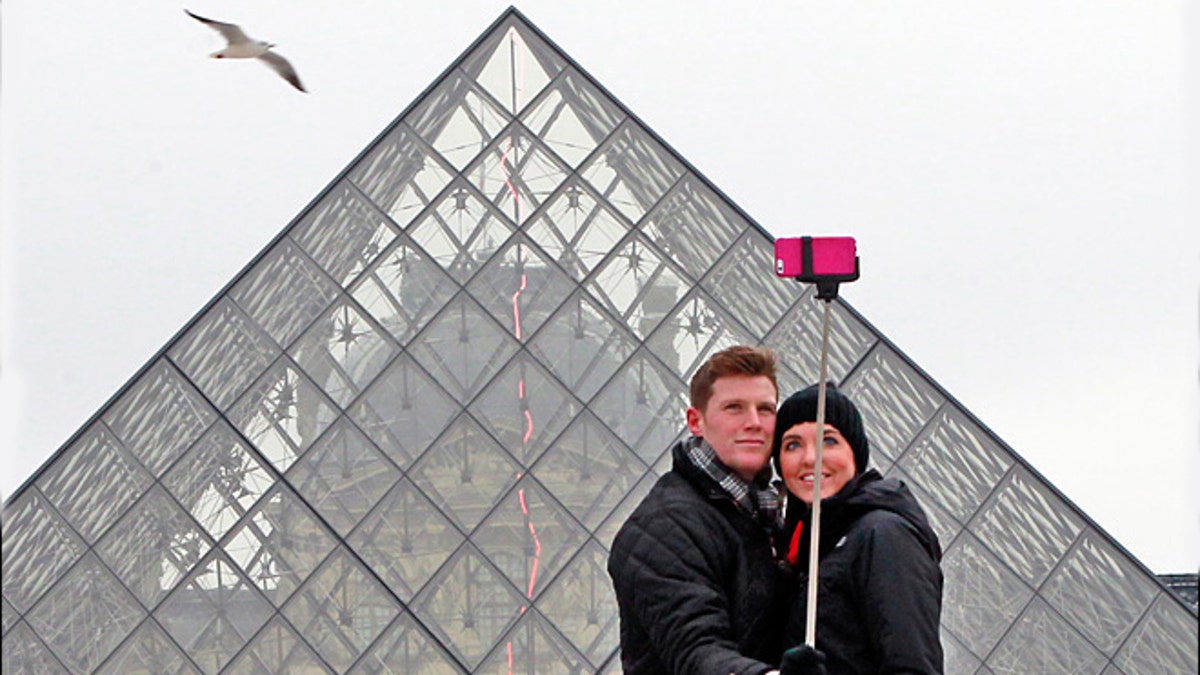
FILE -- Jan. 6, 2015: Chris Baker and Jennifer Hinson from Nashville, Tennessee, use a selfie stick in front of the Louvre Pyramide in Paris. (AP Photo/Remy de la Mauviniere)
In case you missed the latest accessory driving this country’s obsessive social media habit, the selfie stick now provides a person with an extended appendage so that he or she may take better photographs of him or herself while using a Smartphone.
We have become tethered to our Smartphones, and our narcissism disengages us from our immediate social surroundings.
Now, selfies can include a broader, more panoramic view of a person and their surroundings, allowing us to produce a tightly controlled visual narrative of our lives on social media. But the problem with selfies is they can provide a façade of a life that is reduced to a string of orchestrated moments in time.
We have become tethered to our Smartphones, and our narcissism disengages us from our immediate social surroundings.
The selfie is indicative of an American culture that emphasizes individualism and pride. Americans are not shy about highlighting what is great about our country. Overt expressions of patriotism are common, and we revel in our relative strong position in the world. But the world is changing, and although there is nothing wrong with pride in one’s country, not everything is always as it seems.
If we could look beyond the frames of our selfies, there are reasons to be concerned. The emotional state of Americans is troublesome, especially among our future leaders. Based on survey results, the American Psychological Association stated that younger Americans (18-33) reported higher stress levels than the national average. This may have something to do with the uncertainty they face over their economic futures coupled with the fact that student loans have now become the second largest source of household debt in the U.S.
While we obsess about our latest Facebook update, others in the world are obsessing about academics. Education in America lags behind.
The latest results for the Program for International Student Assessment (PISA) ranks the U.S. below average or average among OECD countries in a number of categories, including mathematics, science, and reading. South Korean and Singaporean students are commended for high academic achievement, while their American counterparts are lambasted on popular segments like "Watters’ World" on Fox News, suggesting that the millennial generation is out of touch with the real world.
And despite the photographs of our smiling faces that are plastered all over social media, a recent study by a San Diego University psychology professor revealed that more Americans are reporting symptoms of depression than in decades past. Furthermore, according to the World Happiness Report and the OECD Better Life Index, Americans are not among the happiest people in the world.
We have become tethered to our Smartphones, and our narcissism disengages us from our immediate social surroundings.
Walk on any college campus in between classes and you will see zombie-like students who have mastered the art of walking and texting at the same time, avoiding any direct human contact with one another.
Furthermore, social media can desensitize us to real problems faced by others. For example, disparaging attitudes or comments about those on social welfare are likely encouraging efforts in several states to consider legislation to drug test welfare recipients. Rather than facilitating dialogue on important policy issues, social media has become an outlet for diatribes against our fellow citizens.
Of course, not all social media is bad, and there are also lots of potential benefits to be reaped by it. Just look at how many people were willing to dump ice water over their heads for the sake of charity.
My main point is that we should probably show humility more often on social media, and the selfie stick is not helping us. Just like our country as a whole, Americans are facing challenges and some are even struggling economically, socially, and/or emotionally. So put down that selfie stick and stop pretending that everything is all right. We have work to do.








































